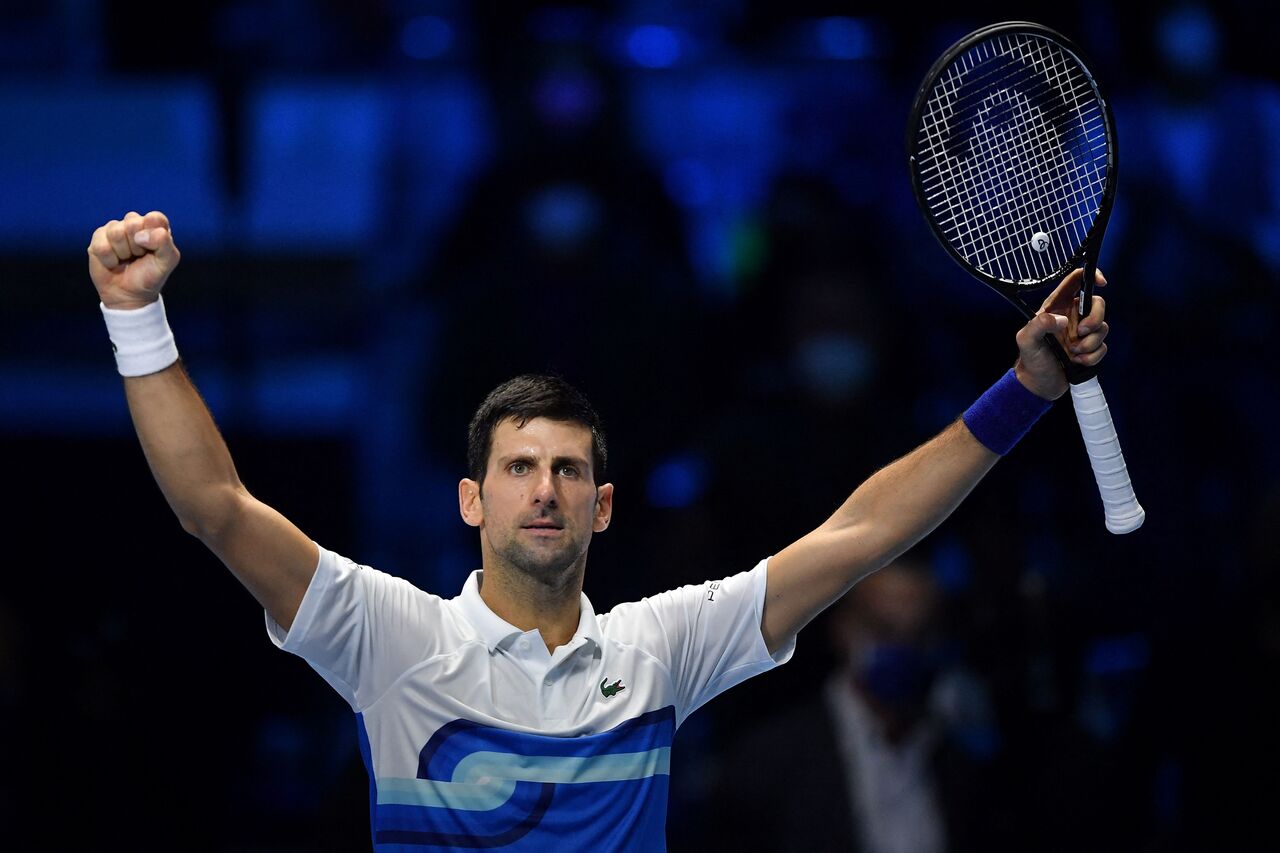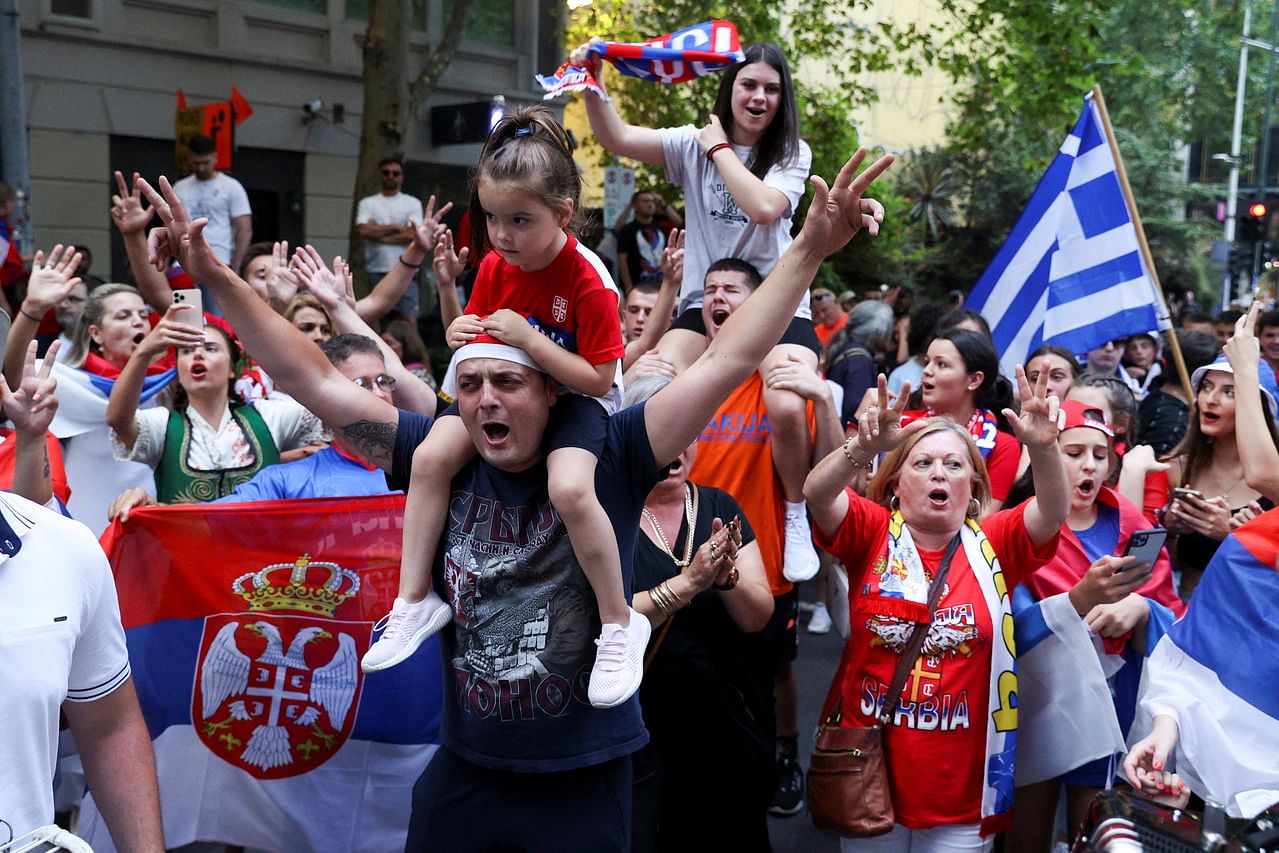Tennis: Djokovic wins court case, Australian judge orders release from detention
Sign up now: Get the biggest sports news in your inbox

This rekindles Novak Djokovic's chance to win a record 21st Grand Slam title at the upcoming Australian Open.
PHOTO: AFP
MELBOURNE (REUTERS) - An Australian judge ruled on Monday (Jan 10) that Novak Djokovic be released from immigration detention, finding the government's decision to revoke the tennis star's visa to enter the country was "unreasonable".
Judge Anthony Kelly ordered Djokovic be released within 30 minutes and his passport and other travel documents returned to him, rekindling the world No. 1's chance to win a record 21st Grand Slam title at the Australian Open, which starts next Monday.
However, lawyers for the federal government told the court the country's immigration minister was reserving the right to exercise his personal power to again revoke Djokovic's visa.
Djokovic, 34, has been held in an immigration detention hotel alongside long-term asylum seeker detainees since Thursday. He was permitted to attend his lawyers' chambers for the virtual hearings but has not been seen in public since he arrived in Australia.
His lawyers argued that a recent Covid-19 infection qualified Djokovic for the medical exemption from a requirement for non-Australian citizens entering the country to be double vaccinated.
The Australian government, however, said non-citizens had no right of guaranteed entry to Australia, questioned his claimed exemption and stressed that even if Djokovic wins the court action, it reserved the right to detain him again and remove him from the country.
A government lawyer warned Australia may yet use ministerial powers to order Djokovic’s removal from the country, which would result in him being banned for three years.
With the Australian government facing a humiliating and high profile defeat, lawyer Christopher Tran informed the judge that immigration minister Alex Hawke may step in with executive powers.
“I’m instructed (the minister) will consider whether to exercise a personal power of cancellation,” he said.
After confirming that such a step, if taken, would bar Djokovic from the country for three years, Kelly warned the government lawyers that “the stakes have now risen, rather than receded.”
Hawke’s office did not immediately respond to requests for comment.
Kelly said he had quashed the government decision to cancel Djokovic’s visa because the player was not given enough time to speak to tennis organisers and lawyers to respond fully after he was notified of the intent to cancel his visa.
Kelly noted that officials at Melbourne’s airport made the player switch off his phone from midnight to around 7.42am local time, when the decision to cancel his visa was made.
Officials also reneged on an agreement to give Djokovic until 8.30am to speak to tournament organiser Tennis Australia and lawyers, the judge said.
Djokovic was instead woken up by officials at around 6am after a brief rest and said he felt pressured to respond.
The player, a long-term vocal opponent of mandatory vaccination, told border officials he was unvaccinated and had had Covid-19 twice, according to a transcript of the interview.
Kelly said he had quashed the government decision to cancel Djokovic’s visa because the player was not given enough time to speak to tennis organisers and lawyers to respond fully after he was notified of the intent to cancel his visa.
Kelly noted that officials at Melbourne’s airport made the player switch off his phone from midnight to around 7.42am local time, when the decision to cancel his visa was made.
Officials also reneged on an agreement to give Djokovic until 8.30am to speak to tournament organiser Tennis Australia and lawyers, the judge said.
Djokovic was instead woken up by officials at around 6am after a brief rest and said he felt pressured to respond.
The player, a long-term vocal opponent of mandatory vaccination, told border officials he was unvaccinated and had had Covid-19 twice, according to a transcript of the interview.
Kelly earlier told the court it appeared Djokovic had sought and received the required medical exemption from Covid-19 vaccination on the basis that he had contracted the virus last month. He had presented evidence of this before he travelled to Melbourne and when he landed last Wednesday evening (Jan 5).
“What more could this man have done?” Kelly said.
Kelly’s ruling did not directly address the issue of whether the exemption on the grounds of an infection in the past six months was valid, which the government had disputed.
Tennis Australia CEO Craig Tiley said earlier that his organisation had spoken with federal and state officials for months to ensure the safe passage of players.
Tennis Australia did not immediately respond to a request for comment.
“What more could this man have done?” Kelly said.
Kelly’s ruling did not directly address the issue of whether the exemption on the grounds of an infection in the past six months was valid, which the government had disputed.
Tennis Australia CEO Craig Tiley said earlier that his organisation had spoken with federal and state officials for months to ensure the safe passage of players.
Tennis Australia did not immediately respond to a request for comment.
It was not immediately clear if the ruling would affect Czech player Renata Voracova, who was detained in the same hotel as Djokovic after having her visa revoked after issues with her vaccine exemption.
Voracova left the country on Friday without challenging her status, the Czech Foreign Ministry said.
Djokovic’s case had caused anger in Australia, where more than 90 per cent of the adult population is double vaccinated and public opinion has been largely against the player.
Emotions run particularly high in Melbourne, which experienced the world’s longest cumulative lockdown.
Voracova left the country on Friday without challenging her status, the Czech Foreign Ministry said.
Djokovic’s case had caused anger in Australia, where more than 90 per cent of the adult population is double vaccinated and public opinion has been largely against the player.
Emotions run particularly high in Melbourne, which experienced the world’s longest cumulative lockdown.

<p>Supporters of Serbian tennis player Novak Djokovic rally in the street outside what is believed to be the location of his lawyer's office during an ongoing day of legal proceedings over the cancellation of his visa to play in the Australian Open, in Melbourne, Australia, January 10, 2022. REUTERS/Loren Elliott</p>
PHOTO: X03952
The country’s Covid-19 cases surpassed one million on Monday (Jan 10), with more than half of them recorded in the past week, driving up hospitalisation numbers, straining supply chains and overloading testing facilities.
Former Prime Minister Kevin Rudd accused current leader Scott Morrison’s centre-right coalition government of bungling the situation.
“Total incompetence! If they seriously didn’t want him, why on earth did they give him a visa to fly here?” Rudd said. “This was conceived as one giant distraction strategy when out in the real world people can’t get tested.”
Former Prime Minister Kevin Rudd accused current leader Scott Morrison’s centre-right coalition government of bungling the situation.
“Total incompetence! If they seriously didn’t want him, why on earth did they give him a visa to fly here?” Rudd said. “This was conceived as one giant distraction strategy when out in the real world people can’t get tested.”
The saga kicked off when Djokovic posted a photo of himself leaning on his luggage on Instagram last Tuesday (Jan 4), telling the world he was headed to Australia to compete in the Open with a vaccination exemption.
Photographs published on social media showed him appearing at public functions in Serbia in the days after he tested positive on Dec 16. It was not clear if Djokovic knew of his positive test at the time.


